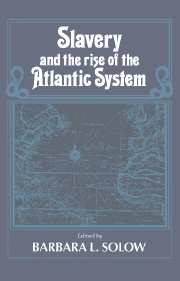Book contents
- Frontmatter
- Contents
- Preface
- List of contributors
- Introduction
- 1 Slavery and colonization
- 2 The Old World background of slavery in the Americas
- 3 Slavery and lagging capitalism in the Spanish and Portuguese American empires, 1492–1713
- 4 The Dutch and the making of the second Atlantic system
- 5 Precolonial western Africa and the Atlantic economy
- 6 A marginal institution on the margin of the Atlantic system: The Portuguese southern Atlantic slave trade in the eighteenth century
- 7 The apprenticeship of colonization
- 8 Exports and the growth of the British economy from the Glorious Revolution to the Peace of Amiens
- 9 The slave and colonial trade in France just before the Revolution
- 10 Slavery, trade, and economic growth in eighteenth-century New England
- 11 Economic aspects of the growth of slavery in the seventeenth-century Chesapeake
- 12 Credit in the slave trade and plantation economies
- Index
3 - Slavery and lagging capitalism in the Spanish and Portuguese American empires, 1492–1713
Published online by Cambridge University Press: 20 October 2009
- Frontmatter
- Contents
- Preface
- List of contributors
- Introduction
- 1 Slavery and colonization
- 2 The Old World background of slavery in the Americas
- 3 Slavery and lagging capitalism in the Spanish and Portuguese American empires, 1492–1713
- 4 The Dutch and the making of the second Atlantic system
- 5 Precolonial western Africa and the Atlantic economy
- 6 A marginal institution on the margin of the Atlantic system: The Portuguese southern Atlantic slave trade in the eighteenth century
- 7 The apprenticeship of colonization
- 8 Exports and the growth of the British economy from the Glorious Revolution to the Peace of Amiens
- 9 The slave and colonial trade in France just before the Revolution
- 10 Slavery, trade, and economic growth in eighteenth-century New England
- 11 Economic aspects of the growth of slavery in the seventeenth-century Chesapeake
- 12 Credit in the slave trade and plantation economies
- Index
Summary
THE long and complicated historical relationship between slavery and capitalism is both elusive and unclear. This is true both in its initial phase and in its later development. As elsewhere in Europe, the Iberians had employed slaves in various social and economic situations long before the manifestation of what may be properly termed the advent of capitalism. Indeed, slavery formed an integral part of the social and organizational structure of society from distant antiquity. Capitalism, on the other hand, represented a relatively modern innovation in European societies, dating probably no earlier than the seventeenth century – with some understandable lag time for the Spanish and Portuguese states. Both slavery and capitalism, however, were essential characteristics of the new, dynamic imperialism that fueled the expansion of Europe after the fifteenth century. Although the connection between slavery and imperialistic capitalism may not have been either linear or direct, it is difficult to deny the catalytic function of the former for the latter. Expansion of slavery and the slave trade became an important instrument in the expansion of empire.
Portugal and Spain did not initiate their overseas empires merely to derive economic benefits from slavery and the slave trade. Slave trading was not foremost in their plans. Nevertheless, economic pursuits constituted an integral component of the early restless expansion of these two Iberian states across the Atlantic and into the Indian and Pacific oceans.
- Type
- Chapter
- Information
- Slavery and the Rise of the Atlantic System , pp. 62 - 74Publisher: Cambridge University PressPrint publication year: 1991

